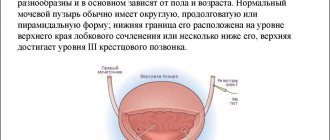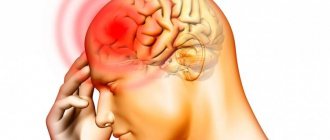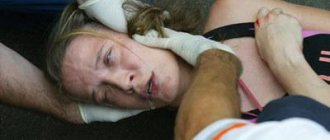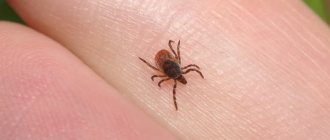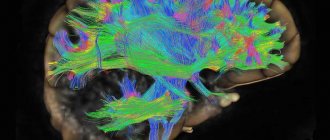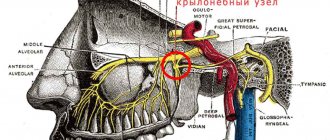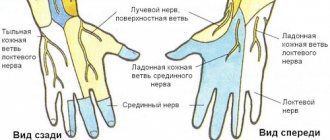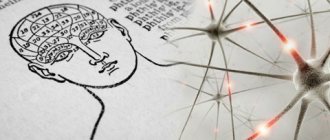The process of urination is regulated by two structures of the nervous system - the spinal cord and the center in the cerebral cortex. Neurogenic bladder is a syndrome that is formed when cortical control is turned off and is characterized by hypertonicity or atony of the muscle layer. The therapeutic course includes medications, physiotherapeutic procedures, psychotherapy is recommended, and, if necessary, surgery is performed.
Neurogenic bladder is a pathology in which control over the process of enuresis is lost.
Causes of development of neurogenic bladder
Problems with urinary regulation arise for a variety of organic and functional reasons. When the correct innervation of the urinary tract is disrupted, a person becomes unable to consciously control the process of emptying the bladder. The muscles of the organ are tense or, conversely, passive. Most often, this condition develops when there is a malfunction of the central nervous system. The disease is not independent and affects men and women equally. In children, a similar condition manifests itself due to injuries and pathologies identified at birth, and can also be a consequence of fright. Neuromuscular regulation of the bladder in adults is disrupted due to:
- brain diseases;
- head and spine injuries;
- spinal cord pathologies;
- tumors and inflammation in the central nervous system;
- violations of sphincter contractility;
- chronic tension and stress.
Type of pathology and symptoms
Neurogenic bladder in women and men is manifested by identical symptoms, which appear from time to time or are constant. The intensity of manifestations is determined by the complexity of nervous regulation failures. There are two clinical types of the disease: bladder hypotension (the so-called hypoactive type) and organ hypertension, which have different symptoms and require an individual approach to treatment. The symptoms of both types are described in the table.
| Type of pathology | Signs |
| Hyperreflexive | A strong urge to urinate that suddenly becomes more frequent at night |
| Passing very small amounts of urine | |
| Painful urination | |
| The occurrence of false urges or incontinence | |
| Stimulation of sudden urination by irritation of the femoral or pubic area | |
| Diuresis at night prevails over daytime | |
| Increased blood pressure and heavy sweating | |
| Hypoactive | Feeling of bladder fullness |
| It takes a lot of strain to urinate. | |
| Feeling of incomplete emptying | |
| Sudden discharge of urine in small doses | |
| Accumulation of large amounts of residual urine up to 400 ml |
With prolonged denervation of the urine reservoir, degeneration of the organ walls develops.
Causes of urinary dysfunction
In young children, neurogenic urinary syndrome is caused by disruption of the nerve (neural) connections that regulate prolonged filling and rapid emptying. The reasons that provoke this dysfunction are different:
- autonomic dysfunction (peripheral nerve conduction disorder);
- inflammation of nerve fibers - neuritis;
- congenital anomalies of the urinary organs;
- difficult childbirth, during which the child’s nervous system is injured;
- neoplasms in the spine - oncological and benign;
- damage to one of the parts of the brain (cerebral palsy);
- diabetes;
- encephalitis;
- weak reflex to urinate;
- spina bifida.
To the list of causes of neurogenic disease, it is necessary to add the hormonal imbalance observed in girls of both prepubertal and puberty.
Increased production of estrogen provokes sensitivity of the muscular membrane of the urinary system organ - the detrusor, so incontinence is observed more often in them.
How is diagnosis carried out?
The study of the neurogenic bladder is based on laboratory tests and hardware examination.
To make a diagnosis and select therapy, you need to contact a urologist. The first step will be a survey and medical history. The doctor may require the patient to keep a diary, which records the frequency of trips to the toilet and the portions of urine excreted. Differential diagnosis is required. This is followed by the appointment of a range of studies to identify the factor that provoked the neurogenic bladder:
- determination of biochemistry and general parameters of blood and urine;
- analyzes using the methods of Zimnitsky, Nechiporenko;
- urine culture for bacterial flora;
- ultrasound examination of the kidneys;
- urinary endoscopy;
- radiography: excretory urography, pyelography;
- urodynamic assessment: cystometry, sphincterometry;
- nervous system check: CT, MRI, X-rays of the spinal column and skull, encephalogram.
Complications and consequences
Most congenital diseases of the nervous system in children affect the quality of urination, but neurological symptoms often come first. Complications of impaired urination occur faster than in adults.
- Mental disorders (anxiety, depression, sleep disturbances) that reduce the level of quality of life.
- With inadequate treatment, the disease can lead to serious consequences for the patient’s health - the development of chronic cystitis (inflammation of the bladder), vesicoureteral reflux (reflux of urine from the bladder back into the ureters and kidneys, followed by their atrophy and the development of chronic renal failure), pyelonephritis ( microbial inflammatory kidney damage), etc.
What is included in the comprehensive treatment of the disease?
Neurogenic bladder dysfunction in men and women requires a comprehensive approach. The therapeutic regimen depends on the intensity of the manifestations of the disease and the conditions that provoked it. Medicines and physical therapy procedures are used, and surgical operations are performed. Such a pathology significantly worsens the patient’s psychological well-being, therefore, in order to normalize the emotional state, it is advisable for him to attend psychotherapy sessions.
Medicines that affect urinary contractility
Depending on the type of pathology, a neurogenic bladder requires the use of different medications. In case of excessive contractility, treatment is aimed at reducing hypertonicity and improving blood circulation in the tissues of the organ. To calm a spastic urinary tract, intravesical injection of “Resinferatoxin” and “Capsaicin” has been recognized as an effective method. Additionally, the following tools are used:
Medicines for neurogenic bladder are selected depending on the provocateur of the disease.
- anticholinergic - "Propantheline";
- alpha blockers - "Dibenziran";
- calcium antagonists - "Nifedipine";
- tricyclic antidepressants - Melipramine;
- medicines containing succinic acid;
- antioxidants, coenzymes, vitamins - “L-kartinine”.
It is more difficult to cure a hyporeflexive bladder. This type of disease is often complicated by infection. It is necessary to strengthen the motor activity of the bladder muscles, to prevent urinary incontinence or stagnation. Among the methods of physiotherapy, electrophoresis with Proserin is effective. To increase the tone of the organ, the following medications are suitable:
- m-cholinomimetics - “Aceclidine”;
- sympathomimetics - “Imipramine”;
- alpha-blockers - “Ephedrine”;
- antibacterial agents - "Bactrim".
Features of lifestyle and nutrition during therapy
If you have a neurogenic bladder, it is important not to overindulge in fluids and avoid unhealthy foods.
During the treatment of a neurogenic bladder, it is better for the patient to stay in a hospital setting in order to avoid psychological discomfort in society and maintain emotional stability. If the source of problems with the bladder is the neurological nature of the pathology, the patient needs bed rest. Regular performance of special gymnastics is recommended, which trains the muscles of the bladder and will allow you to control the overactive organ. The patient must establish a drinking regime. The nutritional scheme corresponds to diet No. 7, which means excluding smoked meats, salty, sour, fatty foods, strong tea and coffee, and soda from the diet.
With reduced activity of the bladder, it is important to ensure its regular emptying by applying external pressure to the abdominal wall, using exercises for the muscles of the pelvic floor, or placing a catheter.
Symptomatic therapy with folk remedies
Traditional medicine does not treat neurogenic urinary disorders. Homeopathy suggests ingesting soothing decoctions of chamomile, St. John's wort, mint, valerian, centaury, and linden. Lingonberry leaves and wheatgrass rhizomes will help prevent infection. For incontinence, rosehip and sage decoction with dill seeds will help. Carrot juice is beneficial.
Classification
This disease is divided according to the severity classes of the disease into:
- mild degree (incontinence during stress, nocturnal enuresis, frequent urination during the day);
- medium (“lazy” bladder);
- severe (Ochao and Hinman syndromes).
According to the characteristics of the bladder reflex:
- hyporeflex bladder (during the period of filling, the detrusor is toned);
- hyperreflex (in the excretion phase the detrusor is relaxed);
- areflex (urine accumulates uncontrollably, to large volumes).
Threatening consequences of advanced disease
A neurogenic bladder can provoke a number of complications, some of which threaten the patient’s life. First of all, these are psychological disorders, disruption of social adaptation due to episodes of uncontrolled urination and an unpleasant odor accompanying the person. Impaired bladder function of the hyporeflex type often leads to urine being thrown back into the urinary tract, which causes inflammation and blood poisoning with toxins. Stagnation causes the proliferation of pathogenic bacteria and bladder degeneration. Also, stones can form in any part of the urinary tract. A bladder that is too full creates a risk of rupture and the development of peritonitis.
How does pathology manifest itself?
The disease proceeds according to a hyper-reflex or hypo-reflex scenario. In the first case, patients complain of frequent urges and difficult or ineffective intercourse. In the second group of patients, there is no urge to urinate, emptying the bladder spontaneously, which causes serious discomfort in life.
Typical manifestations of the disease are as follows:
- the need to urinate many times during the day;
- false urges and difficulty urinating;
- urinary incontinence;
- delayed micturition.
How to avoid problems with urination?
The development of a neurogenic bladder can be avoided by eliminating emotional stress, trauma, and vitamin deficiency.
In order for the neuromuscular regulation of urination to remain normal, it is necessary to promptly treat diseases of the urinary system, avoid excessive stress, and injury to the pelvic area, spine and head. Also, in order not to hear the diagnosis of “neurogenic bladder,” you should protect your feet from getting wet and hypothermia. If severe nervous stress occurs, you should seek help from a psychologist. To maintain body tone, do not neglect light physical activity and take care of a balanced diet and try to give up bad habits.

